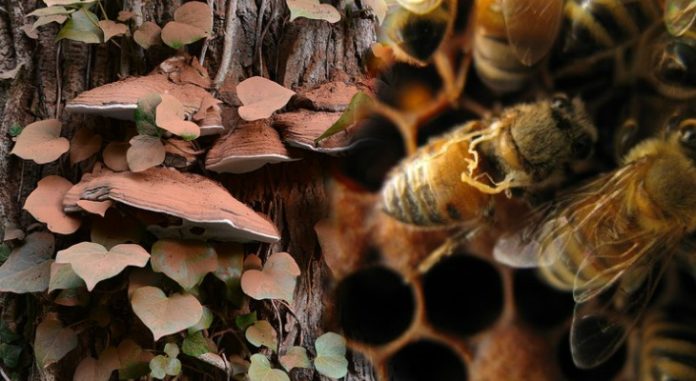
By By trueactivist.com
Remember Paul Stamets, the guy who holds the patent that could destroy Monsanto? After partnering with an entomologist, he discovered that a certain type of mushroom can protect bees from viruses, pesticides, AND mites!
Life without bees isn’t life at all. Seriously, have you considered just how empty supermarkets would be if the tiny, bumbling insects went extinct?
Since the 1980’s, bee populations have diminished dramatically. At least 61 culprits – from viruses to pesticides – have been blamed, but scientists are still groping for answers.
One culprit in particular – the mite – is thought to be a major contributor to colony collapse. Because the varroa destructor mite’s life is so short-lived, it has been able to evolve and develop resistance to pesticides that have been previously able to control it.
Thankfully, a solution to the catastrophe may already exist. It just took a mushroom expert and a scientist to discover it.
Remember Paul Stamets, the guy who holds the patent which could destroy Monsanto? Well, after he noticed bees eating mycelium (the root-like filaments of mushrooms) in his garden, the mycologist figured there was a possible relationship between his crop of mushrooms and bee health.

Credit: CrossCut.com / omafra.gov.on.ca
He set out to test this theory by launching a research project which was backed by the National Institutes of Health and the Defense Department. Eventually, he was able to confirm that compounds in certain mushrooms boost a bee’s immune system.
His research also concluded that mushrooms on certain trees frequented by bees in the Pacific Northwest can protect the insects from viruses. That’s not all: the mushroom nutrients also help bees break down harmful pesticides and chemicals.
Clearly, mushrooms are magical in more ways than one. Stamet’s next step was to figure out how the fungi could help protect bees from the mites.

Credit: GoodNewsNetwork
The mushroom expert teamed up with Washington State University entomologist – and beekeeper – Steve Sheppard to test his theories. Together, they have been exploring the idea that mushrooms might be able to protect bees from the harmful parasites.
One mushroom specifically, the Metarhizium anisopliae, appears to be able to kill the varroa mites without hurting the bees. Stamens and Sheppard are now testing beehives that contain the mushrooms to determine if they do, in fact, work as a natural protection for colonies.
The duo are doing this by dropping chunks of cardboard dusted with finely ground powder from the mushroom into standard bee boxes. In order to keep the hive orderly, the bees rip out the clutter and, in effect, dust themselves in the potentially mite-killing compounds.
Presently, they are working with one of Washington state’s largest beekeeping operations.
The results have yet to be determined, but many are hopeful that the Metarhizium anisopliae is the long sought-after solution to colony collapse.
Said Stamets:
“Nature leads us to solutions if we connect the dots, are open minded and think creatively.”
What are your thoughts? Please comment below and share this news!
This article (Mushroom Beehives Could Be The Solution To Colony Collapse) is free and open source. You have permission to republish this article under a Creative Commons license with attribution to the author and TrueActivist.com
Read More: http://www.trueactivist.com/mushroom-beehives-could-be-the-solution-to-colony-collapse/





que bom que ele tenha percebido, eu quando moleque era do tipo que ficava a olhar a natureza, diziam que eu jogava tempo fora, taí a prova contrária, observador não joga tempo fora!